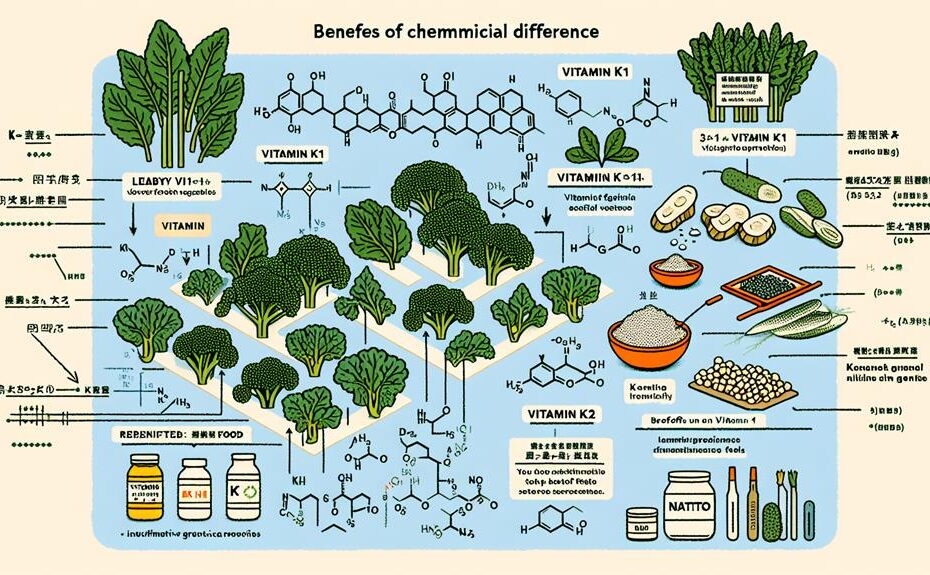







When comparing Vitamin K1 to Vitamin K2, you'll find that they serve different roles in your body. Vitamin K1 is essential for blood clotting, while Vitamin K2 supports bone health and cardiovascular function. Vitamin K1 is mainly found in leafy green vegetables, whereas Vitamin K2 is present in fermented foods like natto. Both vitamins are absorbed differently in your intestines and have specific functions in activating different proteins. If you want to know more about how Vitamin K1 and K2 differ and their impact on your health, continue exploring their roles in blood clotting, bone health, and cardiovascular function.
Key Takeaways
- Vitamin K1 is primarily involved in blood clotting, while Vitamin K2 supports bone health and cardiovascular function.
- Vitamin K1 activates clotting factors II, VII, IX, and X, whereas Vitamin K2 activates proteins C and S.
- Vitamin K1 is abundant in leafy greens, while Vitamin K2 is found in fermented foods and certain cheeses.
- Vitamin K1 is absorbed in the proximal small intestine, while Vitamin K2 is efficiently absorbed in the distal small intestine and colon.
- Vitamin K2 helps prevent arterial calcification and supports heart health by directing calcium, reducing coronary heart disease risk.
Sources of Vitamin K1 and K2
When searching for dietary sources of Vitamin K1 and K2, it is important to explore a variety of foods abundant in these essential nutrients. Vitamin K1, also known as phylloquinone, is primarily found in leafy green vegetables like kale, spinach, and broccoli. On the other hand, Vitamin K2, or menaquinone, is more commonly sourced from fermented foods such as natto, sauerkraut, and certain cheeses. Both forms of Vitamin K play an essential role in blood clotting, bone health, and cardiovascular function.
Dietary sources rich in Vitamin K1 and K2 offer various health benefits. Vitamin K1 supports proper blood clotting, helping to prevent excessive bleeding. Meanwhile, Vitamin K2 aids in bone metabolism, reducing the risk of osteoporosis and promoting bone strength. Additionally, Vitamin K2 is crucial for heart health as it helps prevent calcium from depositing in the arteries, reducing the risk of cardiovascular diseases. Ensuring a diverse intake of foods containing these vitamins is essential for maintaining overall health and well-being.
Absorption and Bioavailability
To optimize the benefits of Vitamin K1 and K2, understanding their absorption and bioavailability is vital in ensuring their effectiveness in the body. When discussing absorption, it is essential to recognize that Vitamin K1 is primarily absorbed in the proximal small intestine through a process that involves bile salts and pancreatic enzymes. On the other hand, Vitamin K2 is absorbed more efficiently in the distal small intestine and colon, where it can also be produced by the gut microbiota. Factors like food interactions can influence the bioavailability of both forms of Vitamin K. For example, the presence of dietary fats can enhance the absorption of Vitamin K, while certain medications or health conditions may impair it. Additionally, bioavailability factors such as the form of the vitamin, the individual's gut health, and genetic variations can all play a role in how effectively Vitamin K1 and K2 are utilized by the body. Understanding these absorption mechanisms and bioavailability factors is essential for maximizing the benefits of Vitamin K1 and K2 in maintaining excellent health.
Role in Blood Clotting
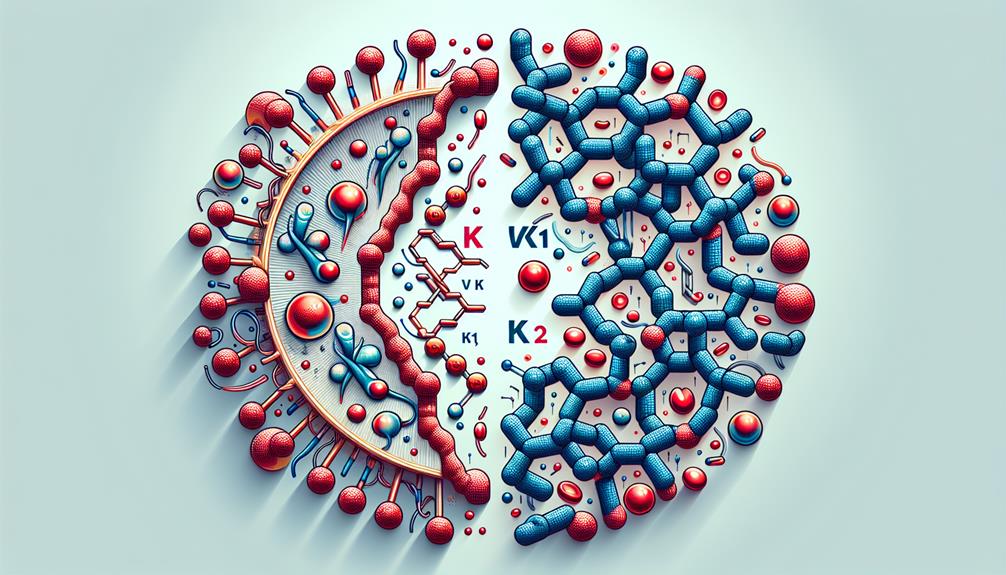
Vitamin K1 and K2 play essential roles in blood clotting by facilitating the activation of clotting factors in the coagulation cascade. The coagulation pathway involves a series of complex reactions that lead to clot formation, important for stopping bleeding. Vitamin K1 is primarily involved in the activation of factors II, VII, IX, and X, while Vitamin K2 is responsible for activating proteins C and S, which regulate clotting by inhibiting excessive clot formation. This delicate balance is important for preventing bleeding disorders like hemophilia or excessive clotting disorders such as deep vein thrombosis.
Regulation of the coagulation pathway is critical to maintaining a healthy balance between clot formation and prevention of excessive clotting. Vitamin K1 and K2 contribute to this balance by ensuring the proper activation of clotting factors and regulatory proteins. Understanding the roles of these vitamins in blood clotting is essential for preventing and managing clotting disorders that can have serious health implications if left untreated.
Impact on Bone Health
Supporting bone health, both Vitamin K1 and K2 play essential roles in bone metabolism and mineralization processes. Vitamin K1 contributes to bone health by activating osteocalcin, a protein required for bone mineralization. On the other hand, Vitamin K2 is involved in activating osteoblasts, cells responsible for bone formation. These vitamins also help in regulating calcium within bones, which is vital for maintaining bone density and strength.
Studies suggest that low levels of Vitamin K are associated with an increased risk of osteoporosis due to impaired bone mineralization. By promoting the activation of proteins essential for bone health, both Vitamin K1 and K2 play significant roles in reducing osteoporosis risk. Ensuring an adequate intake of both forms of Vitamin K through a balanced diet or supplements can positively impact bone density and lower the risk of fractures.
Cardiovascular Health Effects
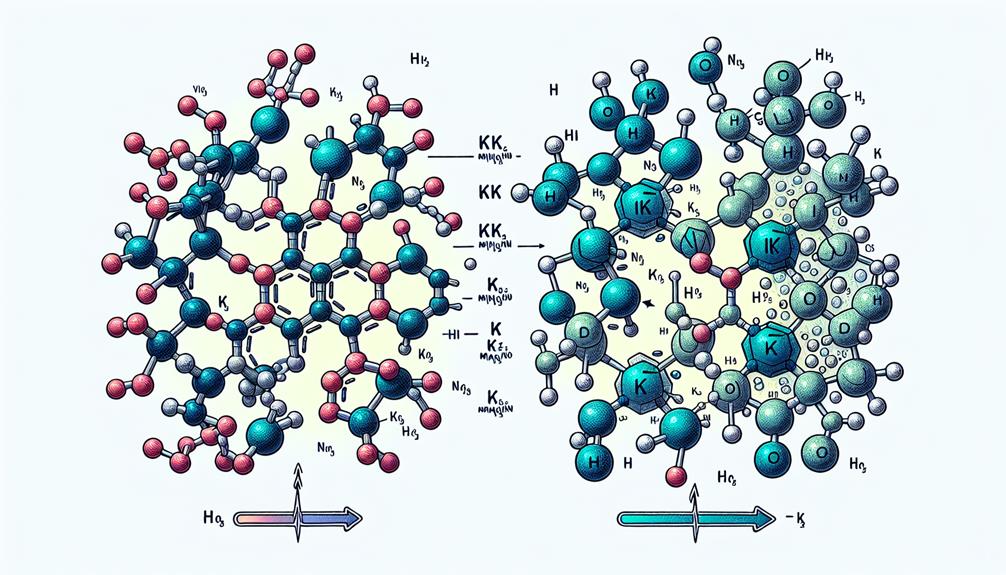
Both Vitamin K1 and K2 have been linked to various cardiovascular health effects, highlighting the importance of these vitamins beyond bone health. Studies suggest that Vitamin K2, in particular, may offer notable dietary benefits for heart protection. Vitamin K2 is thought to play a critical role in cardiovascular health by helping to prevent the calcification of arteries, which is a significant risk factor for heart disease. By activating proteins that help direct calcium to where it's needed in the body, Vitamin K2 supports overall heart health. Additionally, Vitamin K2 has been associated with a reduced risk of coronary heart disease and atherosclerosis, further emphasizing its potential heart-protective effects.
On the other hand, Vitamin K1 also contributes to cardiovascular health by supporting blood clotting processes. While both forms of Vitamin K are essential, the emerging research on Vitamin K2's specific role in heart protection makes it a promising nutrient to include in your diet for overall cardiovascular well-being.
Conversion and Metabolism
In the body, vitamin K1 and vitamin K2 undergo distinct conversion and metabolism processes that determine their specific roles and functions in various physiological pathways. Vitamin K1, found in green leafy vegetables like spinach and kale, is mainly involved in blood clotting. Once ingested, vitamin K1 is absorbed in the small intestine and transported to the liver, where it is used to activate clotting factors.
On the other hand, vitamin K2, present in fermented foods like cheese and natto, plays an important role in bone health and cardiovascular function. After consumption, vitamin K2 is absorbed in the small intestine and is then transported to various tissues, including bones and arteries, where it regulates calcium metabolism.
Both vitamin K1 and K2 offer essential health benefits, with K1 mainly contributing to blood clotting and K2 supporting bone mineralization and preventing arterial calcification. Including a variety of dietary sources of both vitamin K1 and K2 can help maintain ideal levels and support overall health.
Recommended Daily Intake
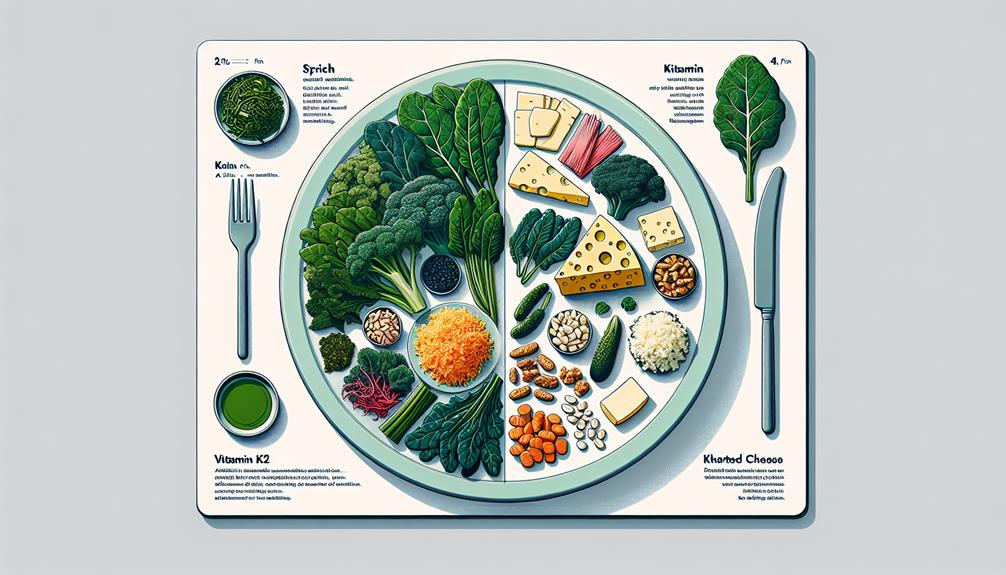
When considering the daily intake of vitamin K1 and vitamin K2, it is important to understand the recommended amounts for maximum health benefits. Vitamin K1, found abundantly in leafy green vegetables like kale and spinach, has a recommended daily intake of about 90 to 120 micrograms for adult males and females, respectively. On the other hand, vitamin K2, primarily sourced from fermented foods like natto and cheese, lacks a specific daily intake recommendation established by health authorities. However, some experts suggest around 45 to 185 micrograms per day for general health maintenance.
Both vitamin K1 and K2 play pivotal roles in blood clotting and bone health. Vitamin K1 is known for its role in blood coagulation, while vitamin K2, with its longer half-life, is more involved in directing calcium to the bones and teeth, supporting cardiovascular health. Consuming a balanced diet rich in dietary sources of vitamin K1 and K2 ensures you receive their nutritional benefits and supports overall well-being.
Deficiency Symptoms and Risks
Ensuring an adequate intake of vitamin K1 and K2 is vital to prevent deficiency symptoms and associated health risks. Vitamin K deficiency can lead to health consequences such as uncontrolled bleeding, weakened bones, and an increased risk of cardiovascular issues. Vitamin K1 plays a pivotal role in blood clotting, while vitamin K2 is essential for bone health and may help prevent calcification of arteries.
A deficiency in either form of vitamin K can have serious nutritional importance. Insufficient vitamin K1 can result in prolonged clotting times and excessive bleeding from minor wounds. On the other hand, a lack of vitamin K2 may contribute to decreased bone mineral density, potentially leading to conditions like osteoporosis. Additionally, inadequate levels of vitamin K2 can impair the proper distribution of calcium in the body, which may heighten the risk of arterial calcification and cardiovascular problems. To avoid these health risks, maintaining a balanced intake of both vitamin K1 and K2 through a varied diet is essential.
Supplement Options and Considerations
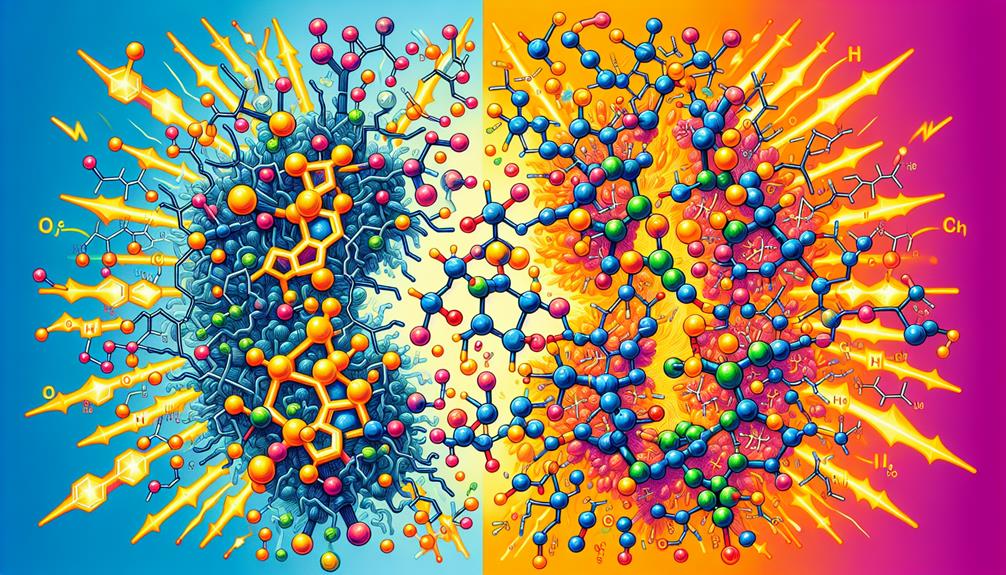
To explore options for supplements and considerations related to vitamin K1 and K2, understanding their distinct roles in the body is vital. When considering supplementation, it is crucial to recognize that vitamin K1 is primarily involved in blood clotting, while vitamin K2 plays a pivotal role in bone health and cardiovascular function. Dosage variances between the two forms of vitamin K exist, with K1 typically found in higher amounts in dietary supplements due to its prevalence in leafy green vegetables, whereas K2 is present in fermented foods and certain animal products.
Potential side effects of vitamin K supplementation are rare but can include gastrointestinal issues such as nausea and diarrhea, particularly with high doses. It is imperative to consult with a healthcare provider before starting any new supplement regimen, especially if you are taking blood-thinning medications like warfarin, as vitamin K can interact with these drugs. Understanding the distinctions between vitamin K1 and K2, along with proper dosage considerations and potential side effects, can help you make informed decisions about incorporating these supplements into your health routine.
